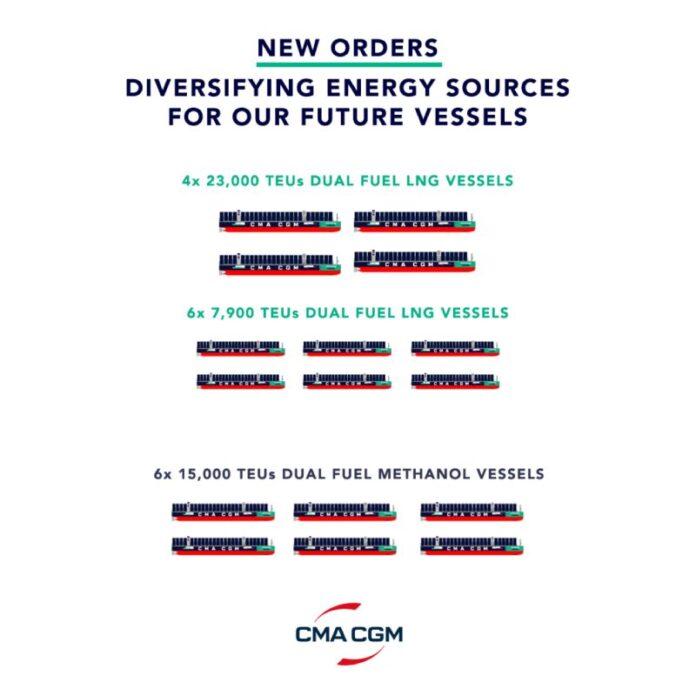
-
Six 15,000-TEU methanol-fueled ships to be added to CMA CGM fleet by end-2025
-
Shift to methanol-powered containerships will expand the liner’s energy mix on the way to becoming carbon-neutral by 2050
-
10 dual-fuel LNG-powered vessels also ordered, taking the orderbook to 69 ships
French shipping and logistics major CMA CGM has placed its first order for methanol-powered vessels to expand its energy mix and become carbon-neutral by 2050.
The company has ordered six 15,000-TEU (twenty-foot equivalent units) dual-fuel methanol-fuelled containerships from an unnamed shipbuilder for delivery by the end of 2025.
“CMA CGM is thus accelerating its decarbonization trajectory by investing massively in gas and methanol fuels. The two sectors will be complementary for decarbonizing shipping industry in the years to come,” the company said.
CMA CGM also ordered 10 dual-fuel liquefied natural gas-powered vessels, bringing its orderbook to 69 ships.
The company has been so far primarily focused on ordering LNG-fuelled vessels to reduce atmospheric pollutant emissions. However, it is now diversifying its energy sources by joining its Danish counterpart Maersk in ordering a methanol-powered fleet.
In 2021, Maersk ordered eight large ocean-going boxships capable of being operated on carbon-neutral methanol, then ordered a further four of such vessels in 2022. It also entered into numerous strategic partnerships to secure green fuel supply for the methanol-fuelled ships.
CMA CGM chose to invest in dual-fuel vessels that run on LNG in 2017. This represents the liner’s first step in reducing greenhouse gas emissions.
The engine installed on these vessels is already compatible with BioLNG derived from biomethane (- 67% in CO₂ emissions) or synthetic methane (including e-methane).
In line with its decarbonization strategy, the group is stepping up its investments and partnerships to introduce “increasingly innovative” solutions.
CMA CGM’s “e-methane-ready” fleet currently counts 29 vessels in service and will have a total of 77 by 2026. To support the growth of its e-methane-ready fleet, the group is developing its LNG bunkering port infrastructure.
In January this year, CMA CGM completed the first ship-to-containership LNG bunkering operation in the Port of Marseille Fos, and in March in the Port of Shanghai. These operations stem from the strong cooperation between the various players in the shipping and port industry.




